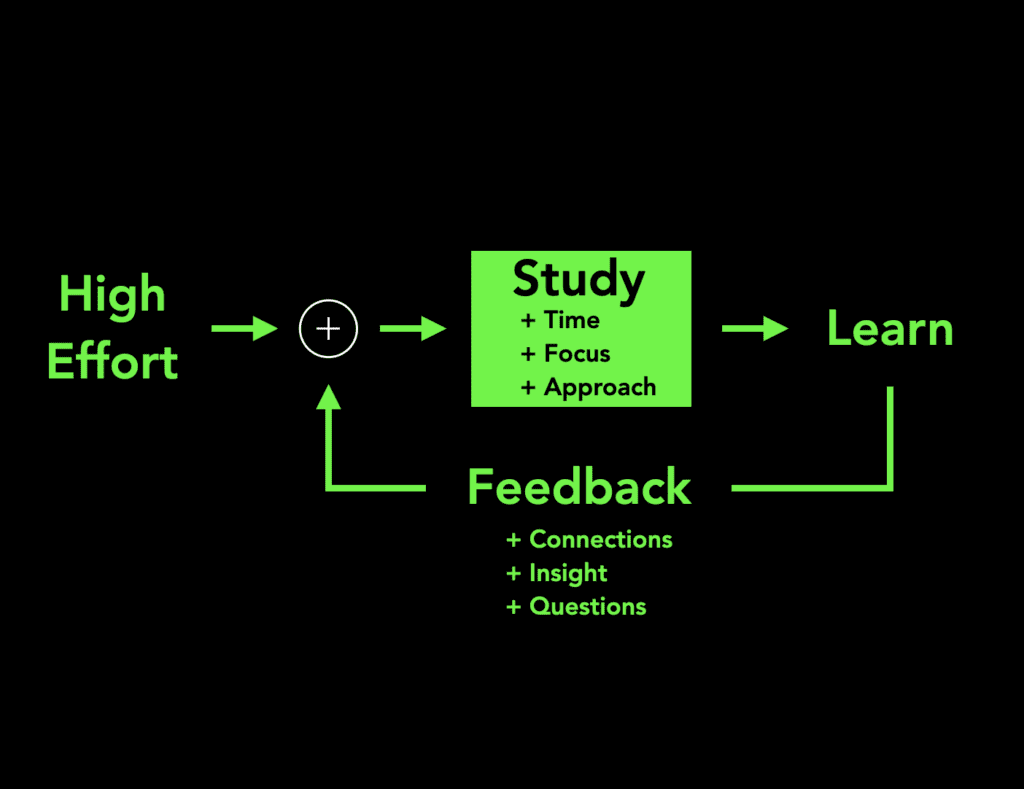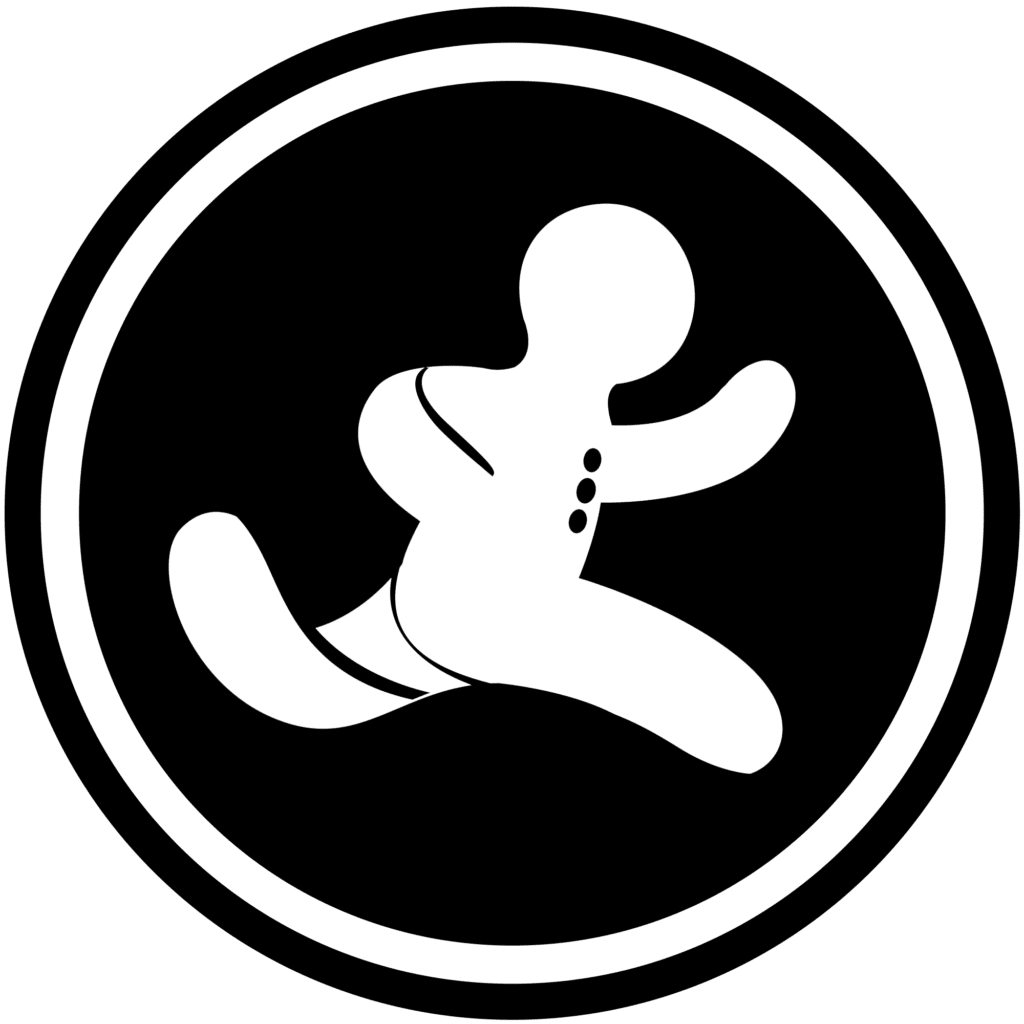
THE CONNECTION BETWEEN HOW YOU STUDY AND HOW YOU LEARN
Studying is a negative feedback loop. Learning is a positive feedback loop. But they are obviously connected. So how does one generate the other?
I had an enlightening exchange with my students earlier this semester. I asked them whether learning was a positive or a negative feedback loop. I argued learning is a positive feedback loop—as I wrote in this post—but some of my students argued it was negative.
I came to realize that we were talking about two different things: the process of studying and the result of learning. The thing is, they both form part of the same feedback loop!
You can see this above. We have input (effort), process (study methods), output (learning) and feedback. Learning is simply the output of the “Studying” feedback loop. Or perhaps “Studying” is just the process portion of the “Learning” feedback loop.
Fast forward to this week and our podcast interviews with Bob Larsen. (Part 1 is below. Part 2 runs Friday night.) One of the things that came through was his emphasis on daily, high quality, consistent work. The longer and better you trained, the better your overall results would be. It’s the same relationship.
It got me thinking about how the two are related. We discussed the connection again in class and we came up with the following idea. I’m sharing it here because even though it needs some work, I think we’re on to something. (I’ve also opened the comments on this post in case you’d like to offer your suggestions.)
A SUPER QUICK REVIEW OF FEEDBACK LOOPS

Negative (or Balancing) Feedback Loops result in maintaining an equilibrium. When we deviate too far from the average, a “control” kicks in and pushes us back to “normal.” We can hover above or below our equilibrium, but the net is that we never stray too far from it. This is the yellow line in the image above.
Positive (or Exploding) Feedback Loops result in exponential change. The more you repeat the cycle, the further away from equilibrium you move. This is represented by the green and red arrows in the image above.
You should definitely read my previous article on why you need to understand feedback loops to get the full picture.
STUDYING IS A NEGATIVE (BALANCING) FEEDBACK LOOP
When we consistently study hard and with high quality, we don’t get exponentially better at studying. We simply complete the process in a way that generates better learning and better feedback.
In the picture above, the negative (balancing) feedback loop hovers around an equilibrium of very high quality. Some days are better than others, but even on the bad days, the quality is pretty high.
Of course, you can imagine the same type of chart for people who have average or low quality study habits as well. It might look like this:
LEARNING IS A POSITIVE (EXPLODING) FEEDBACK LOOP
Learning is the output of our feedback loop. All the effort, study methods, focus and feedback are what contribute to our ability to learn. But the results of our feedback loop don’t always mirror the inputs.
When we average XX hours of high quality study, we can generate exponential improvement in how much we learn. It’s the same process, but the output over time follows a different curve.
Of course, this will be true whether you study well (illustrated above) or you study less well. If your study is average, you can expect average results. If your study is consistently poor, you can expect your results to be exponentially bad.
APPLYING THIS ELSEWHERE
I am not going to dive into it on this post, but I think this same idea can be applied elsewhere.
Your practice routines will be negative feedback loops, but your improvement and development can certainly follow a positive feedback loop.
Great writers write every day. Some days they write more, others less. Some days are good, others are bad. But the net result of that negative feedback loop can be an exponential increase in their output. (Certainly not guaranteed, though.)
Growing a business on social media requires a consistent process of publishing high quality posts. When you have a system that works, and you continue to get feedback and tweak it, you can find yourself getting more and better followers, which creates a positive feedback loop.
I suspect anywhere we have a positive feedback loop in our results there is a negative feedback loop at the heart of it.
SUMMING IT UP
Perhaps a better way to think about feedback loops is to separate the output from the other process. Very often, processes will follow negative feedback loops. We identify how we want the process to run and then we calibrate the process until it’s consistently near the equilibrium. We do this by adjusting our inputs, our feedback, and the process itself.
But results don’t have to be tied to that. Some feedback loops generate output that hovers near an equilibrium. Others generate output that has the potential to build on itself and grow exponentially.
I believe learning is one of these cases. A high quality approach to study involves creating a study routine that you can execute daily. When that routine is good enough, your learning will eventually start to explode.

BRYAN GREEN
Bryan Green is the co-founder, Editor, and COO of Go Be More. He teaches classes on feedback loops to engineering students in Japan. You can improve his feedback loop by contacting him at bryan◎gobemore.co or on our Facebook page.






